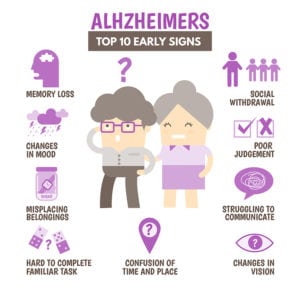 June is Alzheimer’s and Brain Awareness Month, and Great Care is helping educate others on the disease that accounts for 60 to 80 percent of dementia cases.
June is Alzheimer’s and Brain Awareness Month, and Great Care is helping educate others on the disease that accounts for 60 to 80 percent of dementia cases.
According to the Alzheimer’s Association, most people with Alzeheimer’s disease, a progressive form of dementia, are diagnosed after age 65. If diagnosed before 65, the disease is generally referred to as early or younger-onset Alzheimer’s. Dementia is a broader term for conditions caused by brain injuries or diseases that negatively affect memory, thinking, and behavior and interfere with daily living.
“The most common early symptom of Alzheimer’s is difficulty remembering newly learned information,” says the Alzheimer’s Association. “Just like the rest of our bodies, our brains change as we age . Most of us eventually notice some slowed thinking and occasional problems with remembering certain things. However, serious memory loss, confusion and other major changes in the way our minds work may be a sign that brain cells are failing.”

The Alzheimer’s Association reports that the most common early symptom of Alzheimer’s is difficulty remembering newly learned information.
”Alzheimer’s changes typically begin in the part of the brain that affects learning,” says the Association. “As Alzheimer’s advances through the brain it leads to increasingly severe symptoms, including disorientation, mood and behavior changes; deepening confusion about events, time and place; unfounded suspicions about family, friends and professional caregivers; more serious memory loss and behavior changes; and difficulty speaking, swallowing and walking.”
According to the Alzheimer’s Association, people with memory loss or other possible signs of the disease may find it hard to recognize they have a problem.
“Signs of dementia may be more obvious to family members or friends. Anyone experiencing dementia-like symptoms should see a doctor as soon as possible,” the Association says. “If you need assistance finding a doctor with experience evaluating memory problems, your local Alzheimer’s Association chapter can help. Early diagnosis and intervention methods are improving dramatically, and treatment options and sources of support can improve quality of life.”
There’s no cure for Alzheimer’s, but there are treatments that can slow the progression of the disease, says the Alzheimer’s Association. For example, coping skills will help those with Alzheimer’s and their caregivers navigate day-to-day challenges, facilitate independence, and continue a meaningful life with their diagnosis. The Alzheimer’s Association suggests these tips for daily life:
- Set realistic goals and focus on what you can do today.
Set realistic expectations for yourself and use the skills you have to be successful in dealing with challenging tasks. Some tasks may become too difficult for you to complete even with reminder aids. Reduce stress by asking family or friends for help, if needed. - Develop a daily routine.
Make a daily plan to keep track of the few tasks you want to accomplish each day. Having a schedule can reduce the time you spend figuring out what needs to be done and when, and makes you more successful in accomplishing your goals and limiting mistakes. - Approach one task at a time and don’t get stuck.
Give yourself enough time to complete a task. Don’t pressure yourself to succeed. If something becomes too difficult, take a break and try again later. Spending time to change something you cannot control can be a waste of energy and can prevent you from focusing your attention on what you can control. - Know that you have more than one chance to solve most problems.
It’s not uncommon to have to try different strategies to achieve your overall goal. Assess what could have been done differently and make adjustments as needed.
For more information about Alzheimer’s and how to become an advocate, visit https://m.alz.org.
The professionals at Great Care are available to talk with you and your family about all of your home care needs, including respite care. Great Care is a non-medical in-home care agency providing quality and affordable elder care in Fishers, IN and the surrounding areas. Call (888) 240-9101 for more information.
Follow Us!